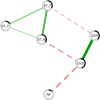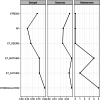Adolescence in lockdown: The protective role of mentalizing and epistemic trust
- PMID: 36256870
- PMCID: PMC9874639
- DOI: 10.1002/jclp.23453
Adolescence in lockdown: The protective role of mentalizing and epistemic trust
Abstract
Objective: Mentalizing is the ability to interpret one's own and others' behavior as driven by intentional mental states. Epistemic trust (openness to interpersonally transmitted information) has been associated with mentalizing. Balanced mentalizing abilities allow people to cope with external and internal stressors. Studies show that social isolation imposed by the COVID-19 pandemic was highly stressful for most people, especially for adolescents. Here we examine whether mentalizing and epistemic trust were protective factors in relation to emotional distress during the lockdown.
Method: A total of 131 nonclinical adolescents, aged between 12 and 18 years, were evaluated during the lockdown using the Reflective Functioning Questionnaire for Youth, Inventory of Parent and Peer Attachment, Perceived Stress Scale, and Difficulties in Emotion Regulation Scale.
Results: Results from network analysis showed that epistemic trust and mentalizing were negatively associated with perceived stress and emotion dysregulation. Epistemic trust in fathers was associated with level of perceived stress, and epistemic trust in mothers with emotion dysregulation.
Conclusion: These findings suggest that epistemic trust and the capacity to mentalize were low in adolescents during lockdown, and this was associated with high levels of stress. However, robust levels of epistemic trust and mentalizing may have acted as protective factors that buffered individuals from the risk of emotional dysregulation during the lockdown.
Keywords: COVID-19; adolescence; epistemic trust; lockdown; mentalizing.
© 2022 The Authors. Journal of Clinical Psychology published by Wiley Periodicals LLC.
Conflict of interest statement
The authors declare no conflict of interest.
Figures



Similar articles
-
Mentalizing, epistemic trust and interpersonal problems in emotion regulation: A sequential path analysis across common mental health disorders and community control samples.J Affect Disord. 2025 Mar 1;372:502-511. doi: 10.1016/j.jad.2024.12.050. Epub 2024 Dec 16. J Affect Disord. 2025. PMID: 39694336
-
The interplay of mentalization and epistemic trust: a protective mechanism against emotional dysregulation in adolescent internalizing symptoms.Res Psychother. 2023 Dec 31;26(3):707. doi: 10.4081/ripppo.2023.707. Res Psychother. 2023. PMID: 38189488 Free PMC article.
-
Personality, Defenses, Mentalization, and Epistemic Trust Related to Pandemic Containment Strategies and the COVID-19 Vaccine: A Sequential Mediation Model.Int J Environ Res Public Health. 2022 Nov 1;19(21):14290. doi: 10.3390/ijerph192114290. Int J Environ Res Public Health. 2022. PMID: 36361183 Free PMC article.
-
Mentalizing, Epistemic Trust, and the Active Ingredients of Psychotherapy.Psychodyn Psychiatry. 2024 Dec;52(4):435-451. doi: 10.1521/pdps.2024.52.4.435. Psychodyn Psychiatry. 2024. PMID: 39679701 Review.
-
The role of mentalizing and epistemic trust in the therapeutic relationship.Psychotherapy (Chic). 2014 Sep;51(3):372-80. doi: 10.1037/a0036505. Epub 2014 Apr 28. Psychotherapy (Chic). 2014. PMID: 24773092 Review.
Cited by
-
Epistemic Trust Is a Critical Success Factor in Psychosomatic Rehabilitation-Results from a Naturalistic Multi-Center Observational Study.J Clin Med. 2023 Dec 28;13(1):177. doi: 10.3390/jcm13010177. J Clin Med. 2023. PMID: 38202184 Free PMC article.
-
Trust under development: The Italian validation of the Epistemic Trust, Mistrust, and Credulity Questionnaire (ETMCQ) for adolescents.PLoS One. 2024 Aug 26;19(8):e0307229. doi: 10.1371/journal.pone.0307229. eCollection 2024. PLoS One. 2024. PMID: 39186540 Free PMC article.
-
Different epistemic stances for different traumatic experiences: implications for mentalization.Res Psychother. 2023 Dec 20;26(3):708. doi: 10.4081/ripppo.2023.708. Res Psychother. 2023. PMID: 38156583 Free PMC article.
-
Transdiagnostic mechanisms of mental health during the COVID-19 pandemic: associations of childhood trauma, maladaptive personality traits, emotion regulation, mentalizing, and pandemic-related distress.Front Psychol. 2024 Dec 18;15:1427469. doi: 10.3389/fpsyg.2024.1427469. eCollection 2024. Front Psychol. 2024. PMID: 39744034 Free PMC article.
-
Epistemic trust: a comprehensive review of empirical insights and implications for developmental psychopathology.Res Psychother. 2023 Dec 20;26(3):704. doi: 10.4081/ripppo.2023.704. Res Psychother. 2023. PMID: 38156560 Free PMC article.
References
-
- Achenbach, T. M. , & Edelbrock, C. (1991). Child behavior checklist. Burlington (Vt), 7, 371–392.
-
- Allen, J. G. , Fonagy, P. , & Bateman, A. W. (2008). Mentalizing in clinical practice. American Psychiatric Pub.
-
- Allen, J. G. , & Fonagy, P. (2014). “Mentalizing in psychotherapy”. In American Psychiatric Publishing textbook of psychiatry . In Edited by Hales R. E., Yudofsky S. C. & Roberts L., 6th. American Psychiatric.
-
- Allen, J. P. , & Tan, J. S. (2016). The multiple facets of attachment in adolescence. In Cassidy J. & Shaver P. (Eds.), Handbook of Attachment (pp. 399–415). Guilford.
MeSH terms
LinkOut - more resources
Full Text Sources
Medical

